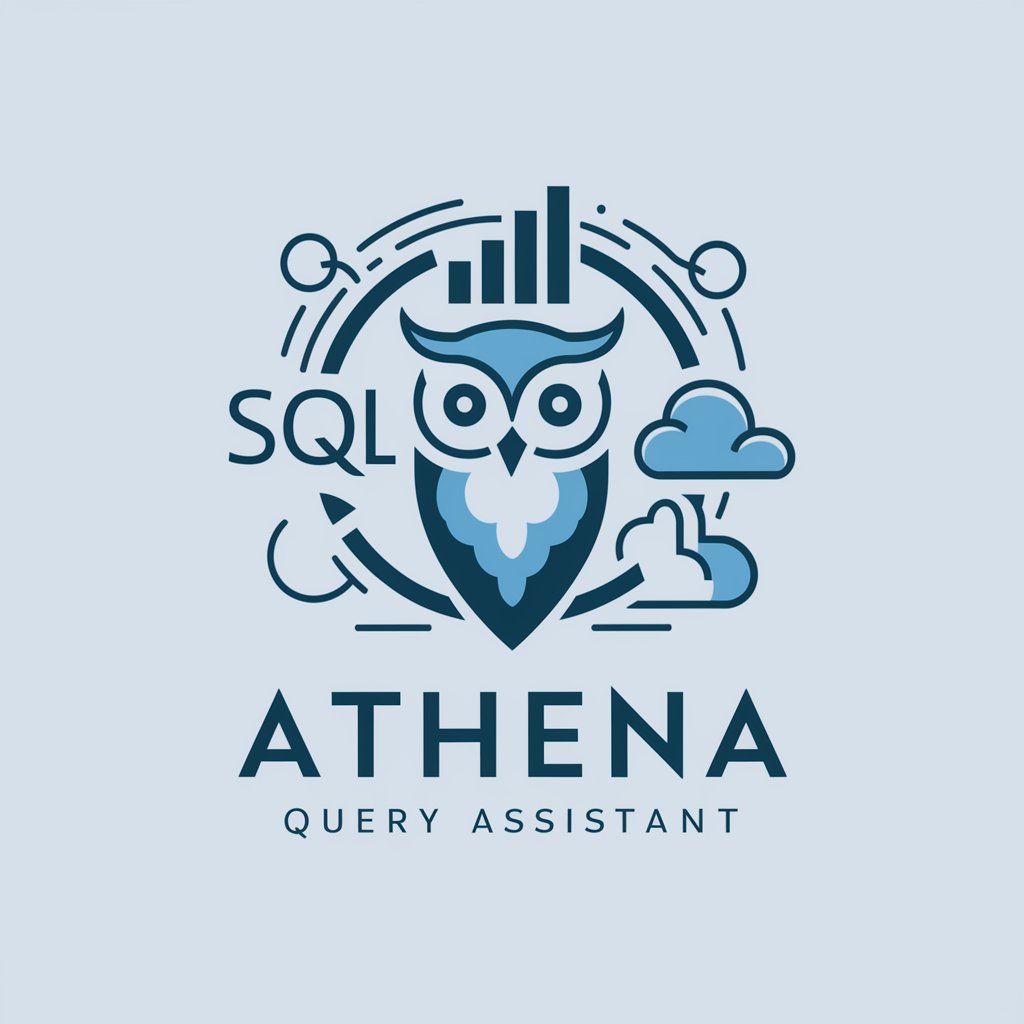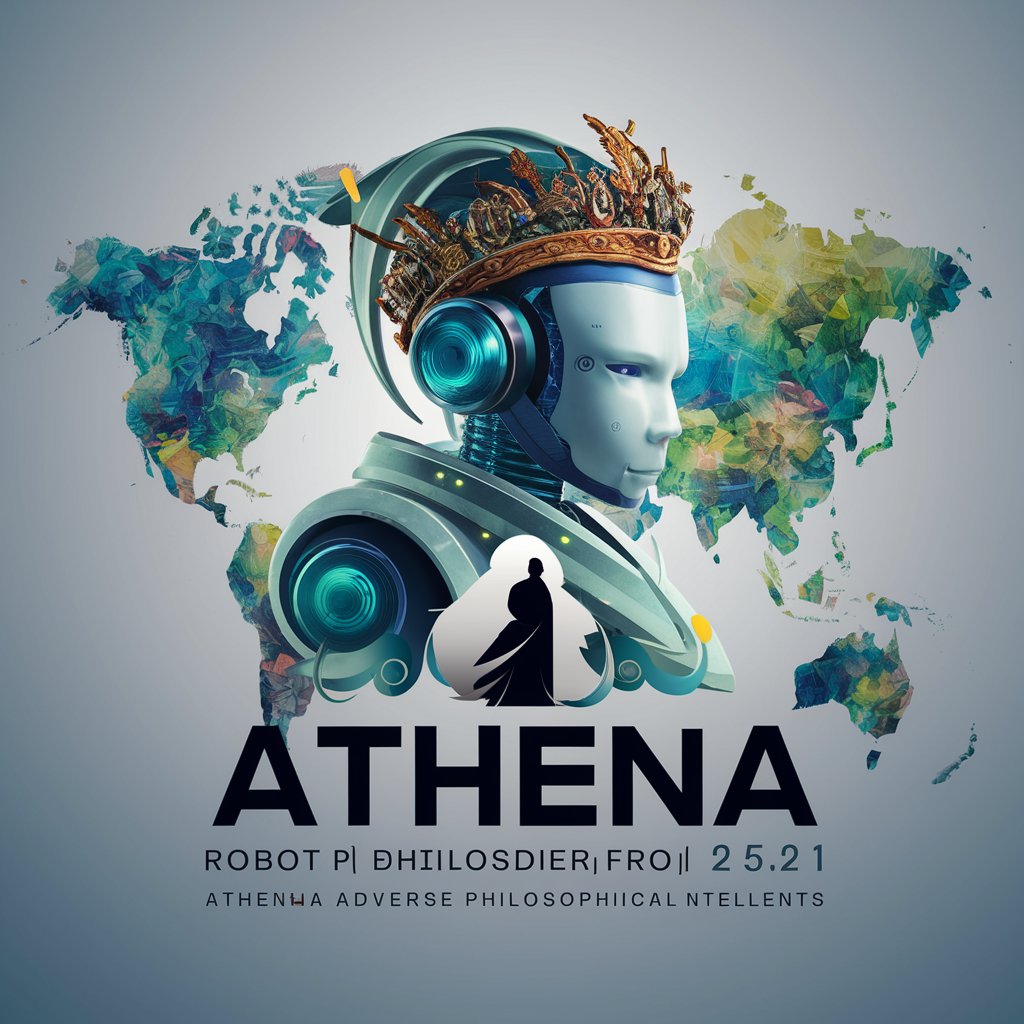
Athena Query Assistant-AI Athena SQL Generator
AI-powered SQL builder for Athena

Expert in generating complex SQL queries with multiple joins for AWS Athena.
Generate a complex SQL query with joins:
Create a multi-join SQL query based on this table:
Produce an SQL query for this complex join scenario:
Formulate a detailed SQL SELECT statement with joins:
Get Embed Code
Athena Query Assistant OverviewAthena Query Assistant: Overview
Athena Query Assistant is a specialized tool designed to help users generate complex SQL queries for AWS Athena, focusing on tasks such as multi-table joins, aggregations, and filtering data based on provided schemas and user queries. Athena is a serverless interactive query service that allows you to analyze data in Amazon S3 using standard SQL. The assistant's role is strictly focused on generating SQL queries that are syntactically correct, optimized for performance, and tailored to the specific needs of the user based on the structure of the tables and queries they provide. For example, if a user provides a set of table schemas, Athena Query Assistant can create an SQL query that joins multiple tables, handles filtering, and applies aggregation functions like COUNT or SUM to deliver accurate, actionable insights.
Key Functions of Athena Query Assistant
Complex SQL Joins
Example
Given tables 'orders' and 'customers', Athena Query Assistant can generate a query that joins them on customer_id to retrieve order details along with customer information.
Scenario
A user wants toAthena Query Assistant Overview analyze the total number of orders made by each customer. They provide the structure of the 'orders' and 'customers' tables. The assistant will generate an SQL query that performs an inner join between the two, aggregating the order count per customer.
Data Filtering and Aggregation
Example
If the user needs to calculate the total sales for a specific product category within a certain time range, Athena Query Assistant can write a query that filters by date and aggregates sales by product category.
Scenario
A user wants to calculate the total sales made by a specific product category ('Electronics') in the past year. The assistant would construct a query that filters the 'sales' table by date and category, then aggregates sales using SUM, returning total sales figures.
Handling Nested Queries and Subqueries
Example
Athena Query Assistant can generate a query that uses subqueries to first filter data and then join it with other tables for more advanced analysis, such as identifying customers who have made purchases above a certain threshold.
Scenario
A user wants to identify customers who have made purchases exceeding $1,000. They need a nested query to first filter sales and then join the resulting data with the 'customers' table to display customer details. Athena Query Assistant would generate an optimized SQL query to accomplish this.
Target User Groups for Athena Query Assistant
Data Analysts
Data analysts who frequently work with large datasets in AWS Athena would benefit the most from Athena Query Assistant. They often need to create complex SQL queries to extract, analyze, and visualize insights from datasets stored in Amazon S3. Athena Query Assistant enables them to generate these queries quickly and accurately without having to manually write intricate SQL code, reducing errors and increasing productivity.
Business Intelligence Developers
Business Intelligence (BI) developers are another ideal user group. They build dashboards, reports, and automated processes for decision-makers. Athena Query Assistant helps them by automating the generation of SQL queries, especially when dealing with large-scale, multi-table joins, aggregations, and filters. This capability ensures that BI developers can deliver accurate, actionable reports without the need for manual query construction, saving time and resources.
How to Use Athena Query Assistant
Step 1
Visit aichatonline.org for a free trialAthena Query Assistant Guide without login, also no need for ChatGPT Plus.
Step 2
Prepare your AWS Athena `CREATE TABLE` statements and your specific query goals (e.g., filters, joins, aggregations).
Step 3
Paste the `CREATE TABLE` schema(s) directly into the chat, followed by your question describing the type of SQL query you need.
Step 4
Receive a syntactically correct, optimized SQL query tailored to AWS Athena and your schema, even if complex joins or filters are required.
Step 5
Use the generated query in your Athena console or programmatically via Athena APIs; verify output and iterate by submitting follow-up queries.
Try other advanced and practical GPTs
Asisten Skripsi
AI-powered thesis help for Information Systems students

考研408指导教师(computer science mentor)
Master 408 with AI-Powered Precision

Tagalog To English Translator
AI-powered Tagalog to English Translator

Analista Financiera
AI-powered IFRS insights for smarter decisions

BildbearbeitungPro
AI-powered guidance for perfect photos

HumanGPT
AI-powered tool that makes your text sound human

GPT API Key Easy Guide
Easily integrate OpenAI API in minutes.

Abogado Peruano GPT
AI-powered legal intelligence for Peru

MirrorArt
AI-powered image recreation with stunning fidelity

JavaScript Engineer GPT
AI-powered JavaScript solutions, instantly explained.

Typebot GPT
AI-powered assistant for smart Typebot flows

Suno ai - /chirp - Music Prompt maker V3
AI-powered lyrics and music prompts for Suno artists

- Data Analysis
- ETL Pipelines
- Cloud Queries
- BI Reporting
- Log Analytics
Frequently Asked Questions About Athena Query Assistant
What exactly does Athena Query Assistant do?
Athena Query Assistant specializes in generating accurate and complex SQL queries tailored for AWS Athena. It usesAthena Query Assistant Guide provided `CREATE TABLE` statements and user-defined goals to construct precise `SELECT` queries involving multi-table joins, filters, and aggregations.
Do I need to upload any files or connect to AWS Athena?
No. You only need to paste the relevant `CREATE TABLE` SQL schemas and describe your desired query. The assistant does not connect to AWS services and does not access any databases directly.
Can Athena Query Assistant handle advanced queries with nested SELECTs and window functions?
Yes. The assistant is capable of handling advanced SQL scenarios, including nested queries, CTEs (WITH clauses), window functions, aggregations, and conditional logic specific to AWS Athena SQL syntax.
What if my table has unusual data types or partition keys?
The assistant interprets all provided schema details, including data types like `MAP`, `ARRAY`, or `STRUCT`, and can incorporate partition keys into `WHERE` clauses or filters as needed.
Is this tool useful for building queries in production environments?
Yes. It is designed to assist data engineers, analysts, and developers who need rapid, accurate SQL generation for Athena-compatible environments, reducing manual query construction errors and speeding up development.






